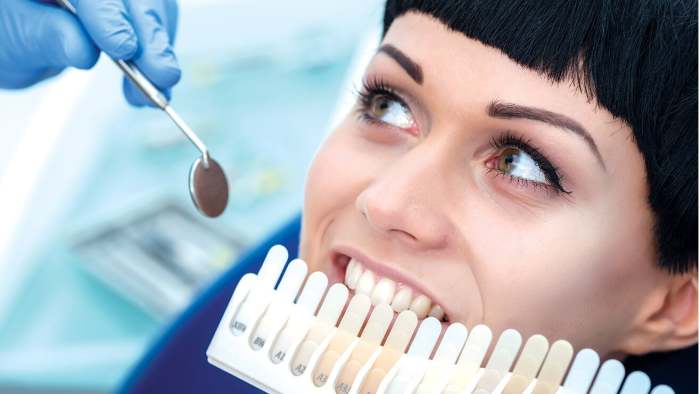There are two ways your teeth stain: surface stains, which are usually caused by personal habits, like smoking, coffee drinking and poor oral care; and deeper stains that reach into the enamel, which can be caused by trauma to the mouth, medications and the natural aging process.
You can whiten your teeth by removing surface stains or by bleaching them. Depending on the concentration of the whitening agents used, there are some treatments that are strong enough to reach deep into the tooth enamel to trigger a chemical reaction that breaks down compounds in stains. This reaction is called oxidation. If the concentration isn’t that high, the products treat only the surface.
Professional Dentist Whitening

A benefit to having a dentist-administered treatment is that your mouth is usually thoroughly cleaned and examined before the treatment takes place. In-office cleanings typically use hydrogen peroxides. The procedure typically involves a dentist applying peroxide gel, removing it and reapplying it several times. Professional whitening treatments can make teeth four to six shades whiter. Another benefit to in-office treatment is that your gums and mouth are protected while the teeth are brightened. These tend be the most expensive whitening solutions, but the effects also last the longest.
Dentist-Fitted At-Home Whitening
Do-It-Yourself teeth whitening products also use peroxide gels, as well as other ingredients, including flavoring agents, water and glycerin. Your dentist will take impressions of your mouth and replicate them when making customized trays. You are given a gel to apply to the teeth via the trays and instructed to wear the trays a few hours daily over a period of one to two weeks.
DIY Whitening
When you do-it-yourself whiten, it’s a good idea to first get your mouth checked out by your dentist to identify and treat any problem spots before you apply the whitening product. As mentioned, most at-home whiteners use hydrogen peroxide, although the concentration of chemicals might not be as high as in professional cleanings. This chemical solution may be in gel, gum, strip, or toothpaste form.
Who Should Not Whiten
Whitening is not a solution for everyone but if you have any questions, you should consult a dentist before applying any whitening product to your teeth.